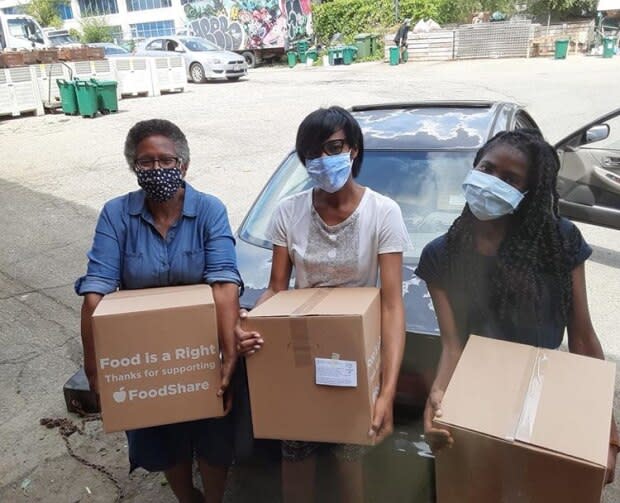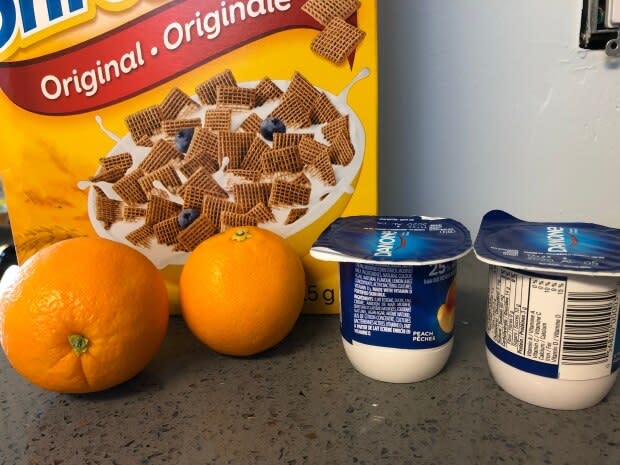Why COVID-19 is forcing the TDSB to delay student breakfast programs
Canada's largest school board has delayed the return of student nutrition programs as tens of thousands of kids begin a staggered return to in-class learning this week — because it's still trying to figure out how to run them while keeping students safe from COVID-19.
For many students in the Toronto District School Board (TDSB), from elementary to high school, going back to class is an opportunity to get the nutrition they need to learn, thanks to school food programs.
But this year, because of the novel coronavirus, plans for such programs are still being ironed out and there is no firm answer as to when they will start or what the programs might look like.
"There will not be breakfast programs for the first eight weeks, anyway, because obviously the most important issue is to get students into school safely and to have no congregating of students," said Sandra Best, the senior director of strategic planning, donor relations and communications with the Toronto Foundation for Student Success, a charitable organization that works with the TDSB.
"And of course, normally in breakfast programs, kids would come in earlier and they would congregate."
Best said morning breakfast programs will instead focus on single-serving packages that can be distributed to students so they don't have to congregate in lunchrooms and cafeterias.

Before the pandemic hit, according to the foundation, TDSB schools served almost 213,000 students nutritious meals every day — mainly through programs run by local parent advisory committees, volunteers, and administrators — that many students rely on every day to have enough to eat so they can focus in class.
The Toronto Catholic District School Board (TCDSB) started their first student nutrition program Friday at Our Lady of Lourdes CS.
"Which is incredible given the challenges around the new COVID regime," said John Yan, executive director with The Angel Foundation for Learning, an organization that supports programs at the TCDSB.
'Grab and go'
The TCDSB will also operate a "grab and go" approach similar to the one the TDSB is contemplating.
"So individualized servings, whether it's a granola bar or an apple, they can grab," said Yan, "and of course, following all of the COVID guidelines with regards to food handling and food safety, as well as on the part of the students ... washing hands and keeping their hands clean."
When schools were shut down due to the pandemic in March, Toronto high school teacher Gita Madan worried conditions that create food insecurity would worsen with the pandemic and the shutdown of schools and nutritional programs would leave many hungry.
She and a couple of colleagues started a program called Food for Thought and delivered produce to students and families in need across the city every single week during the pandemic.
"We spent almost $150,000 on just fruits and vegetables," said Maden, adding "we were able to give big boxes of food produce that last the whole week to 7,000 families in the city of Toronto."

With the end of the initiative and the start of school, her concerns have shifted back to hungry students returning to classes.
"So we are very, very nervous about what's going to happen next because we're not sure if school [nutrition] programs are going to run, if they are going to run, how, where, if there's funding for it, who's going to administer it, what kind of food will be served," said Madan.
School food programs needed this fall, advocate warns
Debbie Field, coordinator of the Coalition for Healthy School Food, says for children to be healthy during the pandemic and to be able to concentrate and learn, school food programs need to continue this fall.
Field, who is also affiliated with the Ryerson Centre for Studies and Food Security, says she doesn't understand why the same food safety guidelines applied to restaurants that have reopened amid the pandemic can't be used to run safe and healthy school food programs.

"I do not accept that volunteers and parents can't come into schools and help cut up some oranges and make sure that each child eats an orange at their desk," said Field.
There are many ways, Field says, that healthy food can be distributed in schools, and even to those children whose families chose the e-learning option this fall, including the option of going in and picking up a snack or lunch.
Field says she hopes teachers, parents, school boards, public health and community agencies come together to look beyond the "grab and go" approach, and to come up with creative solutions to ensure students get nourishing meals.
"Parents all across the city, regardless of their income, know how important these programs are," she said.
"And what's distressing is that COVID could knock this off track when, in fact, everything we know from a science point of view will lead us to know that strong immune systems for children are more necessary during COVID than any other time."


